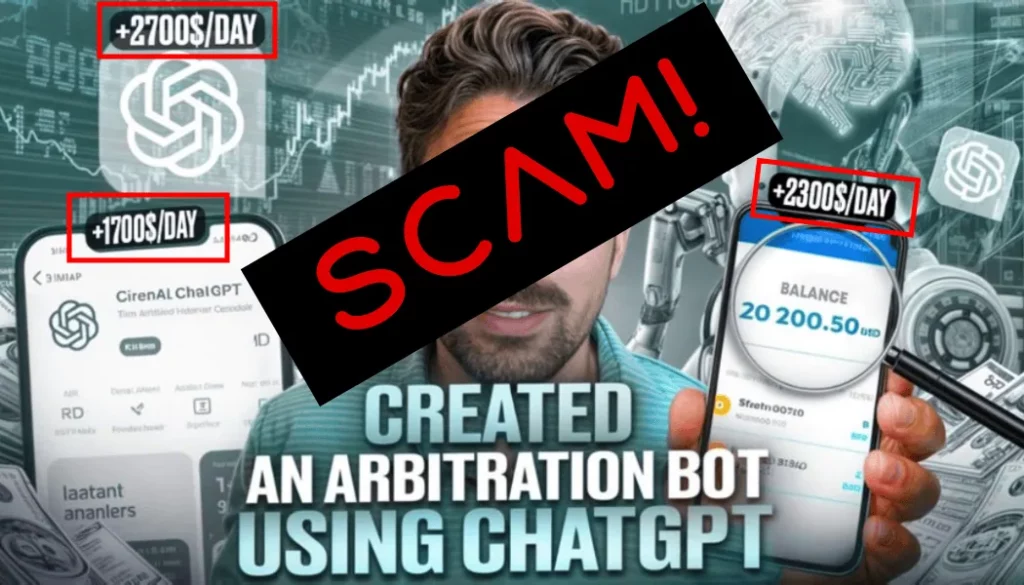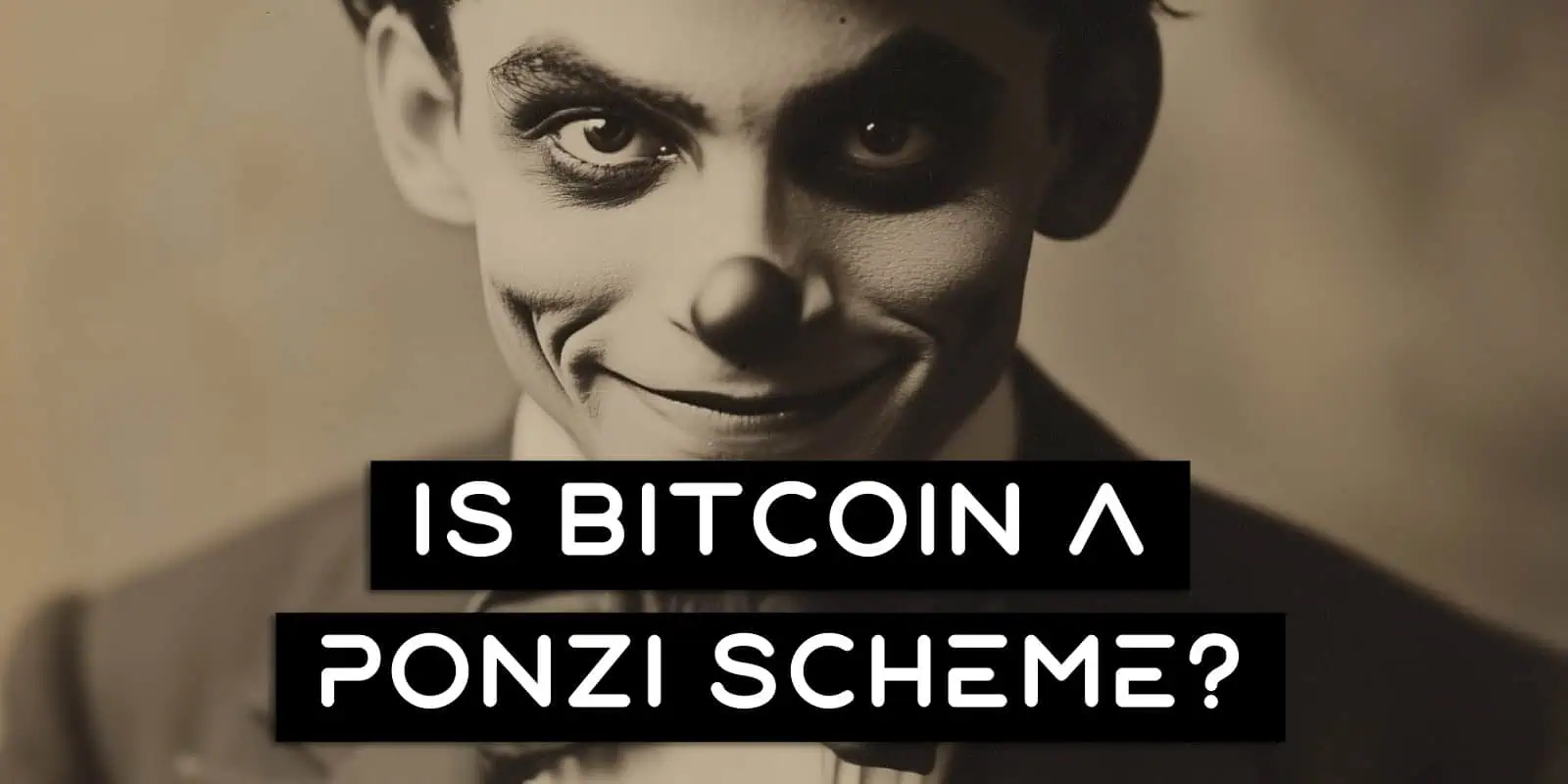A lot of people make a lot of bold, incorrect claims about Bitcoin. Maybe they know better but do it for publicity or to throw others off or some other hidden reasons. One of those incorrect claims is that Bitcoin is a Ponzi scheme. Obviously we believe it isn’t, but today we’re going to explain step-by-step why it isn’t so that you can have confidence that when you invest your hard earned time and money into Bitcoin that you aren’t being scammed.
Contents
Is Bitcoin A Ponzi Scheme?
While a lot of people that don’t like or understand Bitcoin like to state over confidently that it’s a Ponzi scheme, it’s not. A Ponzi scheme is when a person or group of people commit financial fraud. They are the original investors and they get paid returns that come from the money new investors contribute.
A Ponzi scheme is an investment fraud that pays existing investors with funds collected from new investors.
SEC
While Ponzi schemes can go on for a long time unnoticed and get quite big, they always eventually collapse after a few years as they’re fundamentally unsustainable. They need a continuous flow of new money from new investors to stay afloat and once those new investors stop coming in, the flow of that new money also stops and the whole thing collapses.
To say Bitcoin is a Ponzi scheme is to fundamentally misunderstand Bitcoin. For starters, over the course of 2009-2010 period when Bitcoin first debuted, it didn’t even have a trading price. It was quite literally worthless. $0. There were no “original investors”. There were also no subsequent investors. Just Satoshi Nakamoto and a bunch of other pioneering Cyberpunks that were having fun building awesome code for free.
It’s simply impossible for something to be a Ponzi scheme if there’s no investors (old or new).
Even now, where many people do invest in Bitcoin, there is never any flow of money that goes from new investors back to existing ones. If Person A owns 1 bitcoin and Person B comes in and buys 100 bitcoin, Person A still only has their 1 bitcoin. They don’t receive any additional bitcoin because of Person B’s purchase (or anyone else’s purchase). That’s just not how Bitcoin works at all!
But to further prove that Bitcoin isn’t a Ponzi scheme, let’s go through a number of common traits of Ponzi schemes and compare them to Bitcoin.
High Returns, No Risk

Many Ponzi schemes, like most other scams, often promise extremely high returns with little or no risk. This is obviously ridiculous as all investments carry risk, with most being more riskier the higher the returns are. For example the name “Ponzi” actually comes from Charles Ponzi who in the 1920’s promised investors a 50% return within a few months.
Looking at Bitcoin, we also see fantastic returns over the years, much higher than 50% in fact! However we also see huge losses throughout its history too. For example, in 2014 bitcoins return was -59%. In 2018 it was -73% and in 2022 just recently it was -66%. On top of this, as we’ve mentioned before, bitcoin has plenty of risks and is quite volatile both day to day and year to year.
Anyone who claims Bitcoin is “risk free” or “low risk” is flat out lying to you. There’s many risks such as volatility, exchanges committing fraud or going bankrupt, hacking or scam risks, the fact that bitcoin is not insured like bank deposits are, regulatory risks and even base protocol risks.
Overly Consistent Returns
As above, Bitcoin is highly volatile gyrating up and down every hour, every day, every year with extremely wild swings that most can’t stomach. Conversely a Ponzi scheme will usually have very stable and quite unusual consistent returns.
Anyone claiming Bitcoin is a Ponzi scheme obviously hasn’t lived through a bear market where the price nose dived by 80%+ over a few days/weeks! Consistent is absolutely not what anyone would describe Bitcoin’s returns as!
Unregistered Or Unlicensed Investments
As Ponzi schemes are obviously illegal, they often tend to involve investments that are also illegal or that aren’t registered with government bodies like the SEC or state regulators. While Bitcoins regulatory status was a bit uncertain for a long time, it’s now highly certain with the SEC publicly approving many Bitcoin related products.

In January 2024 they approved 11 spot Bitcoin ETF’s which have since gone on to be the literally most successful ETFs in all of history. In just nine months they have collectively attracted over $20 billion dollars of investment capital from every corner of the globe and from every class of investor. It took Gold ETFs over 5 years to reach this same level!
Secretive Or Complicated Strategies
Many Ponzi schemes hide the fact that they’re a Ponzi scheme by employing highly technical or complex investment strategies or just spouting pure technobabble. While it’s not impossible for a complicated investment strategy to be legal and legitimate, Ponzi schemes often use complexity to hide their flows of money and make it difficult for investors to do proper due diligence.
They’ll claim they have some “proprietary” way of basically printing money and that they don’t want to reveal this secret information. They’ll also try and overload investors with complicated information in an attempt to make them just give up at trying to understand how this “magic investment” is getting high and consistent returns.
In actual fact, it’s because it’s all a fraud and the complexity hides that fact until it all collapses. After it’s collapsed and people can see this “secret” it’s clear it’s a Ponzi scheme.
Bitcoin on the other hand is a fully open and transparent network that anyone, even you, can join. All transactions are also publicly available via the Bitcoin Blockchain at any time for free. There are absolutely no secrets with Bitcoin. All transactions are public knowledge, forever. All 21 million bitcoin is fully verifiable every 10 minutes when a block is mined. All source code of Bitcoin Core is fully auditable at any time. Most good wallet software is also open source too.
Don’t Trust, Verify
Bitcoins core mantra is explicitly to not be secretive. It’s to be open, transparent and fully verifiable by any and all parties at all times. While it can get a bit complicated if you dig deep enough into the weeds, this is true of all protocols monetary or informational. For example go look up HTTP (Hypertext Transfer Protocol) and see how complicated that gets!
Difficulty Receiving Payments

Obviously if a Ponzi scheme is collapsing all investors are not going to be able to receive their returns or original investments back. This often materializes as investors having issues with receiving payments. The fraudsters often claim that there’s temporary technical issues or ask the investors to verify their account or jump through other unnecessary hoops in order to delay the truth coming out for as long as possible.
They’ll also often try and keep an investor locked in by offering them higher returns if they just stick around a bit longer, all in an effort to try and keep the grift going. Eventually it collapses and the truth comes out, but by then investors are too late. Their money is gone and they realize that they’ll never see it again or at best, get a fraction of it back via the courts.
Bitcoin once again couldn’t be any further different from this. If you transact with Bitcoin in the correct way, by holding your own Private Keys in your own self custody or private wallet then you always, at all times, have complete and full control over your funds.
There is literally no government on Earth that can stop you sending or receiving payments with Bitcoin. This is also not a puff piece statement either, it’s been battle tested across many countries already with none being capable of stopping it. It is, as Lopp puts it, Fuck You Money. No one can seize your funds. No one can stop you from buying something with bitcoin. No one can steal your bitcoin via inflation. No one.
We should however point out that if you don’t use Bitcoin properly and instead keep your coins on an exchange, then you absolutely can be restricted from transacting. Exchanges are simply third party businesses and they can be fraudulent, for example FTX, restrict your access due to reasons they will never reveal to you and outright steal your funds in some cases.
This is why we, time and time again, try as hard as possible to help people take their bitcoin off exchanges. Leaving funds on an exchange is extremely risky both due the above things as well as due to hacking or social engineering attacks.
Is Bitcoin A Pyramid Scheme?

So Bitcoin clearly isn’t a Ponzi scheme, but what about a pyramid scheme?
A pyramid scheme is an investment fraud in which new participants’ fees are typically used to pay money to existing participants for recruiting new members. Pyramid scheme organizers may pitch the scheme as a business opportunity such as a multi-level marketing (MLM) program. Fraudsters frequently use social media, Internet advertising, company websites, group presentations, conference calls, and YouTube videos to promote a pyramid scheme.
SEC
While pyramid and Ponzi schemes both share some similarities, they are quite different. Once again though Bitcoin is very clearly not a pyramid scheme. For starters, Bitcoin requires no “new” investors to continue functioning. It operated for a long time without any investors at all. If all investment stopped right now, the network would continue and people would still be able to transact with it.
Bitcoin Mining would likely change drastically, with mining companies likely going bankrupt. However the network would self adjust via the difficult adjustment mechanism and once again anyone at home could mine using standard PC’s or laptops in order to support the network.
None of the other hallmarks of a pyramid schemes are present with Bitcoin either. There is a genuine product that you can use, there are no promises of high returns or “easy money” or passive income. There’s also no complex commission structures and most importantly, there’s no emphasis or even requirement for recruiting of new people to invest.
The Athena Assessment
To believe Bitcoin is either a Ponzi or pyramid scheme is to fundamentally not understand what either of those scams are or what Bitcoin is. The most common scenario is that people not only don’t understand the history of Bitcoin or how it works, but also don’t really know what a ponzi scheme is either. They do however see the amazing returns and huge market crashes that happen in Bitcoin and get confused.
The “crypto” world, that is all other altcoins that are not Bitcoin, also doesn’t help this confusion given they routinely do have actually fraudulent scams or schemes going on. Whether it’s pump and dump schemes, Twitter scams, huge exchanges like FTX stealing their own customers funds or many other illegal activities, it destroys peoples trust in the whole crypto space and they then lump Bitcoin in with it, assuming it’s also a scam of some sort.
This is why we at every turn push you our readers to only focus on Bitcoin, Not Crypto. Even when dealing with Bitcoin only investors should as always be cautious and properly study the thing they’re wanting to invest in. We have hundreds of articles solely focused on Bitcoin here as well as a dedicated Investment hub to help with this.
Remember, our stance is clear: focus only on Bitcoin. If you do, you can be absolutely certain that you’re not investing in any type of Ponzi scheme. If you stray to other random cryptos then you’ve been warned!
FAQ
Why Do Governments Hate Bitcoin?
One of the core stated goals of Bitcoin is remove trusted third parties, specifically the central banks of governments around the world. This is to ensure that the money supply is never again debased, which robs wealth from the people. As such, governments aren’t too fond of losing this power and control. That being said, most governments don’t necessarily “hate” Bitcoin. They usually just don’t properly understand it and what great benefits it can bring to the world.
Is Bitcoin A Good Investment?
It depends. We cannot give financial advice as we don’t know your specific financial situation, but Bitcoin has performed exceptionally well over the past. To be very clear though, it has also performed terribly during certain periods due to its extreme volatility. It’s best to see a financial professional that properly understands Bitcoin in order to get the best advice on whether investing in Bitcoin is “good” for you.
Can Crypto Be A Pyramid Scheme?
No. A pyramid scheme is where new investor fees are used to pay existing investors for recruiting new members. In contrast, Bitcoin is a digital commodity like gold or a barrel of oil. When you exchange fiat for bitcoin you are buying that commodity and that’s that. The price is determined by the market, not by how many new investors join the club and there is no recruiting of new members that’s required on your behalf.
Why Is Bitcoin Not Considered The Same As Money?
Bitcoin is absolutely a form of currency. In fact, it’s one of, if not the best currencies humanity has ever discovered as outlined in our piece on What Is A Bitcoin Worth? One reason some may not consider it as a “money” though is due to it not being used as a Medium Of Exchange very often. It does still get used as this daily so even this argument is incorrect.
Does JP Morgan CEO Describe Bitcoin As A Ponzi Scheme?
Yes and no. While he has never been quoted directly as describing Bitcoin as a Ponzi scheme, he has said that he’s a “major skeptic of crypto tokens” and that “they are decentralized Ponzi schemes”. It’s unclear if he is only stating other “cryptos” are Ponzi schemes, or whether he also means Bitcoin is one too. Regardless as stated above, Bitcoin is not a Ponzi scheme. Other cryptocurrencies may fit the definition of a Ponzi scheme however.



